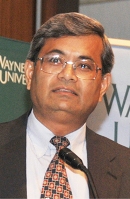
An article by a Wayne State University School of Medicine professor and his research team has been selected for the Faculty of 1000 organization's F1000Prime online directory of top articles in medicine and biology.
"We are pleased that our paper was selected by peers to F1000Prime," said Bhanu Jena, Ph.D., the George E. Palade University Professor and Distinguished Professor of the Department of Physiology.
Articles recommended by F1000Prime are selected, scored and recommended by the Faculty of 1000's scientists and clinical researchers, who canvas more than 3,500 peer-reviewed journals. Faculty of 1000 is a publisher that supports and informs the work of scientists and clinicians. F1000Prime's peer review service highlights and recommends the most interesting articles published in the biomedical sciences, based on the recommendations of a faculty of more than 5,000 of the world's leading scientists and clinical researchers.
In "Proteome of the porosome complex in human airways epithelia: Interaction with the cystic fibrosis transmembrane conductance regulator (CFTR)," published in the Journal of Proteomics in January, Dr. Jena and his research team demonstrate for the first time the interaction of the mucin-secreting porosome complex with the cystic fibrosis transmembrane receptor, or CFTR, in human airway epithelial cells.
The new finding, Dr. Jena said, will greatly facilitate the understanding of CFTR-porosome interactions influencing mucous secretion and composition, and provide critical insights into cystic fibrosis.
"Results from the study open new doors in the identification of possible drug targets for the treatment and management of cystic fibrosis," he said. "Studies are in progress to determine the location of CFTR within the porosome complex in the mucin-secreting human airway epithelial cell line Calu-3, and its interactions with specific porosome proteins, so we may be able to understand its regulation of porosome-mediated mucin secretion."
The F1000Prime citation states that "… the authors establish that CFTR is associated with airway epithelial porosomes, the universal secretory machinery in eukaryotic cells. This work has encouraged further understanding of CFTR in porosomes, its role in mucus secretion and it provides further insight into mucus pathology in CF."
Cystic fibrosis, a respiratory disease, is caused by the malfunction of CFTR, a chloride channel transporter, resulting in viscous mucus in the airways. The surface of the airways is coated with a thin film of mucus composed primarily of secreted mucin, which is under continuous motion via ciliary action. Besides lubricating the airway surface, the secreted mucin functions as a trap for foreign particles and pathogens, thereby assisting in keeping the airways clean and free of particulate matter and infections. Altered mucin secretion especially increases mucin viscosity, resulting in mucin stagnation due to the inability of the cilia to propel them, leading to infections and diseases such as cystic fibrosis.
Secretion is a fundamental cellular process in every living organism, and is required for a variety of physiological activities, such as neurotransmission and the release of hormones and digestive enzymes. Defects in the secretory process in cells are responsible for a host of debilitating diseases, including diabetes, and digestive and neurological disorders. Nearly two decades ago, a cellular structure called the "porosome," discovered by Dr. Jena, was demonstrated to be the universal secretory portal in cells.
Other members of the research team include Professors Fei Sun, M.D., Ph.D., assistant professor of WSU Physiology; Xuequn Chen, Ph.D.; assistant professor of WSU Physiology; Douglas Taatjes, Ph.D., professor of pathology at the University of Vermont College of Medicine; and Guangzhao Mao, Ph.D., professor of WSU Chemical Engineering and Materials Science.